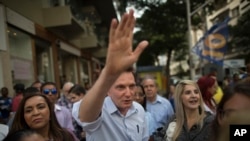Brazilians voted on municipal elections Sunday and experts say the results could influence the 2018 presidential elections.
President Michel Temer’s center-right PMDB (Party of the Brazilian Democratic Movement) and allied parties such PSDB (Brazilian Social Democratic Party) were the biggest winners.
“Those parties, that are being strengthened now in 2016, will have better conditions to present candidates for the presidency in 2018. This then places the PSDB and the PMDB as the two protagonists of this 2018 election,” political scientist Geraldo Tadeu said.
Brazil’s Workers' Party - PT - lost big in the first local runoff elections since Dilma Rousseff’s impeachment.
Local reports say Brazilians want change as they continue to struggle during one of the country's worst recessions and aftermath of the Petrobras scandal; the state-run oil company at the center of a sprawling political kickback scheme.
PT also has no presidential alternatives, according to experts. The Brazilian Senate voted to remove Rousseff from the presidency for pedaladas fiscais - the practice of using public money to fund state or federal social programs without the approval of Congress.
“The PT lost its protagonist so the left will have to reinvent themselves over the next years. The PT will have to battle its position of leadership again within the Brazilian left as the government will certainly lean to the center-right and not the center-left,” Tadeu said.
One of the highlighted battlegrounds took place in Rio de Janeiro, where a conservative evangelical bishop is the new mayor after a run-off election.
Marcelo Crivella took 59.5 percent of the votes while his leftist rival, Marcelo Freixo, a teacher representing the Socialism and Liberty party, received 40.6 percent.
On the campaign trail, Crivella promised to bring order to a city entangled with high crime, impoverished neighborhoods, and a crumbling basic infrastructure.
Experts say voters in Brazil are rejecting mainstream politicians and voting for people with little political experience like Crivella and Freixo, which they say are signs of the polarized times.
“How is it possible that in Rio de Janeiro, a city of joy and openness about sexuality, there will be a mayor who is very conservative, discriminates and opposes Afro-Brazilian religions? The [centrist] alliance that governed the city has broken,” Mauricio Santoro, a political analyst at Rio’s State University, said.
Crivella is a bishop at the well-known and followed Universal Church of the Kingdom of God, founded by his billionaire uncle. He made controversial statements in a book he wrote in 1999 where he called Roman Catholics "demonic" and said Hindus drank their children's blood. He also claimed that homosexuality is evil and that African religions worship "evil spirits."
The bishop, now elected-mayor, said he would devote himself “above all to health, education, transport and public safety.”
Sao Paulo, a city that usually brings recognition to politicians at a national level, elected its new mayor in the first election round back in October. Incumbent Workers’ Party candidate Fernando Haddad received just 16 percent of the vote. Joao Doria from PSDB - the millionaire businessman who led the campaign from the beginning - received 53 percent.
Doria was able to avoid a runoff since he received more than 50 percent of the votes.
But analysts say that while center-right parties had “impressive” wins and could look forward to the upcoming presidential election, these newly elected-officials have to govern and deliver promises during one of the country’s worst recessions.
“Voters could easily become frustrated,” political scientist Fernando Schuler said.





